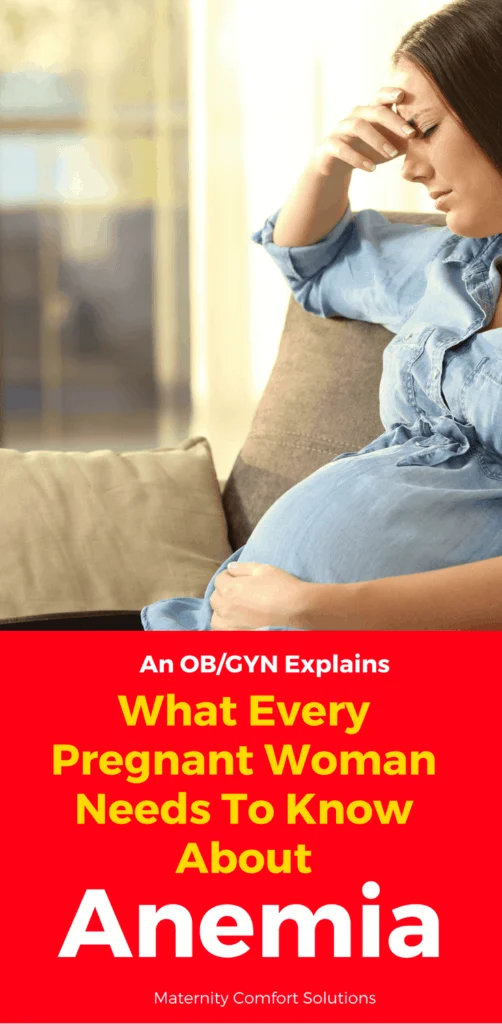Updated August 3, 2022
Anemia during pregnancy must be diagnosed as early as possible for optimal fetal development and to minimize maternal exhaustion.

What is anemia?
“Anemia is a decrease in the total amount of red blood cells (RBCs)
or hemoglobin in the blood, or a lowered ability of the blood to carry oxygen.”
Though there are many causes of anemia, for women, the most common cause is iron deficiency anemia. This form of anemia is often related to heavy menses. Women with heavy menstrual blood loss may not be aware they are anemic. The first time many women will learn they have anemia is when their blood count is checked at their first prenatal visit.
Anemia related to heavy menses occurs gradually and may not result in any symptoms. The reason for this is because of the changes in physiology that occur to compensate for blood loss.
Some of these changes include:
- thinning of the blood to maintain blood volume
- increased heart rate
- constriction of blood vessels to maintain blood pressure
- increased respiratory rate to maintain oxygenation
As previously stated, this gradual onset of anemia may only be diagnosed when bloodwork is drawn or as a result of the onset of symptoms with increased physical activity (ie. rapid heartbeat. shortness of breath).
Though all forms of anemia will eventually become symptomatic, only anemia associated with rapid blood loss causes symptoms that will result in immediate medical attention:
- palpitations
- light-headedness
- fainting (if not attended to promptly).
*Rapid loss of blood does not allow time for the body to make the changes listed above.
Another term to describe asymptomatic anemia is “compensated anemia”. Though well-tolerated at first, symptoms will develop when the body can no longer make changes to maintain adequate oxygen delivery.
Note: If you have heavy menses, go to your healthcare provider for an evaluation to determine if you are anemic. If you have anemia it can be corrected and the cause can be diagnosed. Normal menstrual blood loss should not result in anemia (if you are eating a balanced diet). If you are anemic, the increased energy and exercise tolerance you will experience after treatment can be profound.
Why talk about anemia during pregnancy?
There are two reasons why it is extremely important to discuss anemia during pregnancy:
- Anemia is very common
- Anemia can become severe during pregnancy
Anemia causes exhaustion, especially anemia during pregnancy. This level of fatigue can be very challenging for women trying to keep up with their daily (pre-pregnancy) routine. Once anemia is identified and correctly treated, the symptoms associated with anemia can improve dramatically.
Anemia during pregnancy can also result in decreased delivery of oxygen to the developing fetus. Fortunately, the body will make the necessary changes in maternal physiology to protect fetal growth and development. However, this can take a toll on maternal health. For this reason, as is often stated, expectant mothers need to take care of their health.
* A developing fetus will receive the nutritional support needed, even if it comes at the expense of maternal health.
Iron-Deficiency Anemia During Pregnancy
The diagnosis and management of iron-deficiency anemia during pregnancy is essential for the proper growth of the iron-rich placenta and to allow for the 50% increase in maternal blood volume. Ultimately, the fetal-placental circulation will be responsible for optimal fetal growth and development.
Though this article focuses on iron-deficiency anemia during pregnancy, there are many other forms of anemia.
*** If you have anemia, your prenatal care provider will determine what kind of anemia you have. The diagnosis will be based on your medical history and blood tests drawn at your first prenatal visit. For this reason, it is very important to research and prepare your family and medical history prior to your first prenatal visit.
The various types of anemias are listed below, is presented to simply point out the many types of anemias that exist in the general population.
The list is not all-inclusive:
- Iron deficiency anemia
- Vitamin deficiency (folate and B12 deficiency)
- Sickle cell anemia
- Thalassemia
- Aplastic anemia
- Hemolytic anemia
- Anemia of Chronic Disease
Why is a correct diagnosis of anemia during pregnancy so important?
If you are diagnosed with anemia during pregnancy, it must be properly diagnosed so appropriate treatment and monitoring can be performed throughout your pregnancy.
A correct diagnosis is particularly important because iron supplementation can cause complications if your anemia is not due to iron deficiency. (Though iron deficient anemia is common it should never be assumed to be the cause of anemia.)
At your first prenatal visit, if not sooner (when you book your first appointment) you will likely be given a prescription for vitamins. As has been discussed in previous posts, it is best to start prenatal vitamins prior to conception or most certainly as soon as you know you are pregnant to make sure you are taking enough folic acid, DHA and other important and well-established essential nutrients for fetal development and the prevention of birth defects.
Iron-rich foods are the most tolerant way to get iron into your system.
Unfortunately, you may not be able to get enough iron through diet only.

Iron-rich foods
A prescription for iron is not given until a diagnosis of iron-deficiency anemia is established. If iron is required, Iron supplementation during pregnancy can literally produce “units” of blood up until delivery and this can lessen the possible need for blood should significant blood loss occur at delivery.
An average vaginal delivery can result in a 500cc blood loss and a cesarean section 1000cc loss. I mention this not to be alarming, but to point out the fact that nature prepares the body for this anticipated blood loss as long as the necessary nutrients are made available to produce blood in the bone marrow.
What to know about taking iron:
- Iron will cause your stool to be very dark as most are not absorbed. This is a normal occurrence, though it is important to note that this observation should be noted after starting an iron supplement. If you have dark or tarry stools prior to iron that must be evaluated to be sure is not related to gastrointestinal bleeding (cancer, ulcers etc.).
- Iron often causes constipation and this can be a reason many will stop taking it or decrease their intake of iron. This is a problem, especially during pregnancy because the intestinal tract is slow down by the effects of the hormone: progesterone. If constipation occurs after taking an iron supplement, talk with your healthcare provider. There are many natural supplements to help prevent constipation during pregnancy.
- Hemorrhoids are common during pregnancy due to changes in blood flow. If iron causes constipation, this can worsen hemorrhoids due to straining with bowel movements. Whether or not iron is the cause of constipation during pregnancy, be aggressive about preventing a serious problem with constipation as it can significantly worsen hemorrhoids. Fortunately, unless you have a predisposition to hemorrhoids most times they will resolve completely after delivery.
- Supplemental iron during pregnancy should not be taken at the same time as your prenatal vitamin. Minerals in your prenatal vitamin will compete with iron absorption. Ideally, if you take your prenatal vitamin in the morning, take the iron at night.
- Take an iron supplement (if you are prescribed one) with vitamin C. Iron absorption is facilitated by vitamin C and it is why you will see many iron supplements have vitamin C added to optimize absorption. Plain elemental iron is very poorly absorbed.
- Whenever possible, get iron naturally, as it is better tolerated. Cookbooks are available to help prepare iron-rich diets.
[amazon_link asins=’B005DEK9KE,B01KYCBDMC,B000WUJ7B6,B0062CW1BG,B07BFJ5W4D,B01BCPE408,B01KYBTSQQ’ template=’ProductCarousel’ store=’matcs-20′ marketplace=’US’ link_id=’657aad61-642b-11e8-aaee-23e96b59c6e3′]
IMPORTANT (PLEASE READ):
THOUGH IRON DEFICIENCY ANEMIA IS COMMON… IF YOU HAVE BEEN DIAGNOSED WITH ANEMIA, IT IS ESSENTIAL THAT YOU GET A PROPER DIAGNOSIS FROM YOUR HEALTH CARE PROVIDER. IRON CAN BE TOXIC IF YOUR BODY IS NOT IRON DEFICIENT. IT IS ALSO IMPORTANT TO NOTE THAT IF YOUR IRON STORES ARE TOO HIGH, THIS CAN BE DUE TO A MEDICAL CONDITION KNOWN AS HEMOCHROMATOSIS WHICH CAN CAUSE LIVER DAMAGE. MEDICAL TREATMENT FOR HEMOCHROMATOSIS IS DESIGNED TO REDUCE IRON STORES IN THE BODY.


